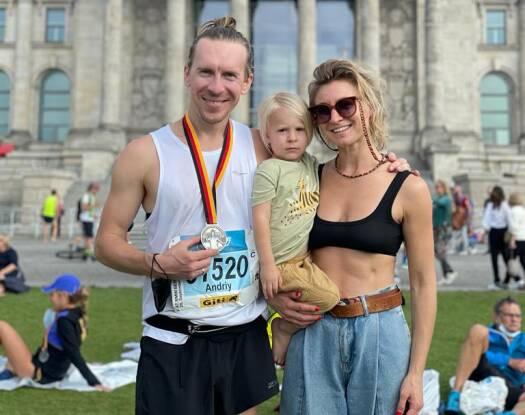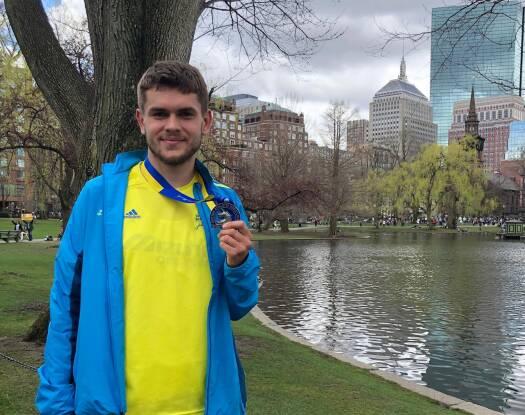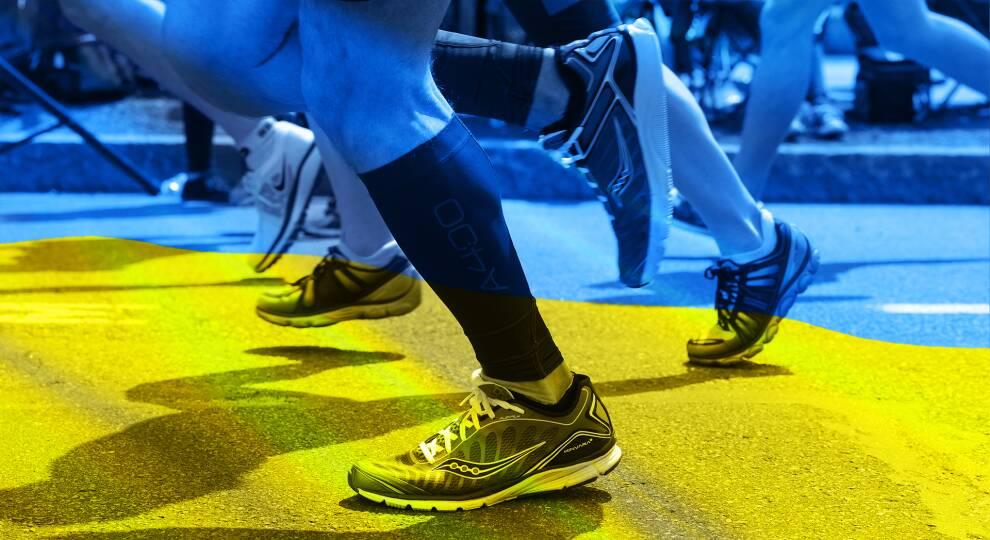Not long after the bombs started falling on Kyiv, Eugen Godun knew he wouldn’t be running the Boston Marathon this year.
Godun, who ran his first marathon in 2014, was planning to run Boston for the second time on Monday. But when the Russian invasion of Ukraine began in February, he fled the capital, leaving behind any hopes of standing at the starting line in Hopkinton.
“I couldn’t run, and I couldn’t even begin to think about running for the first couple of weeks, I think, of the war,” he said. “Because I need to move across the country, leave my house, I have no running … shoes because I left by home with just a bag and that’s it.”
The Boston Marathon has long been a haven for runners from across the globe. This year marks the first race on Patriots’ Day since 2019, as the world’s most famous marathon returns to full strength — or, at least, something like it. While the celebration of running has been years in the making, April 18 will be another loss in a flood of sacrifice for Ukrainians like Godun. For him and other athletes in the country, running has become a way to hold on to a routine and a sense of normalcy shattered by war.
Related: Refugees find a welcome in Catalan Guissona’s ‘Little Ukraine’
A growing culture hits the ultimate roadblock
Volodymyr Solohub, a Ukrainian journalist whose work has appeared on PRX’s The World, is hoping to run the Boston Marathon next year. But unlike in the United States, organized running is a relatively young sport in Ukraine. Solohub got into running after Ukraine’s Revolution of Dignity in 2014, which is right around the time he said it began to really gain traction in his homeland.
Now, the sport is everywhere in Ukraine.
“In the past three, four years, basically every major brand has its own running club,” he said. “I see Nike running club, Puma running club, you know, Adidas, they all have their own running clubs. I see people running in groups on the streets all the time. I don’t think I’ve seen that before.”
He can’t exactly put his finger on why running took off, pointing maybe to those big sneaker brands beginning to invest in Ukraine. But the impact is clear. He said before the coronavirus pandemic stalled events, every major city had at least one marathon and a half marathon.
When the Russian invasion began, however, that blossoming culture got nipped in the bud.
“We literally stopped running,” Solohub said.
“People are dying. … They stay in shelters. And you’re, like, out there in a different part of the country — but still in the same country where the war is — and you’re, like, running.”
The first run Solohub got in post-invasion was more than a week after the attacks started. At that time, he was in the relative safety of western Ukraine, but it still took him about five or six days to feel comfortable and safe enough for a run.
Related: Body armor factories in the Americas are sending gear to war-torn Ukraine
Even then, it didn’t feel like before.
“It was very weird, at first, to put on my running shoes and my gear and go for a run as if nothing is happening, because there’s a war happening,” he said. “You even think if this is appropriate to go for a run when people are dying and they’re being shelled or killed. They stay in shelters. And you’re, like, out there in a different part of the country — but still in the same country where the war is — and you’re, like, running.”
Solohub is still hoping to run the Berlin Marathon in September and Boston next year, though nothing is certain anymore. He’s dropped from running five times a week to once a week, maybe twice, if he’s lucky.
An invasion is the ultimate roadblock for a sport that centers around schedule and routine, one that has runners plan entire years around upcoming races. Now, the calendar has been flipped upside down for just about every Ukrainian runner.
A training trip becomes an escape
Andriy Zagoskin left Ukraine for Egypt at the beginning of the year to train for the Boston Marathon in a warmer climate, away from the snow and ice that made running in his country less than ideal. The plan was to be out of the country from January until about April.
The war turned that training trip into an extended stay abroad, with Zagoskin currently in Turkey with his wife, Nataliia, and their 3-year-old son. That marathon preparation ended up sparing Zagoskin’s family from the worst of the invasion.

Because he’s in Turkey, Zagoskin could still run in Boston — and until recently, that was his plan. But the tentacles of conflict have a long reach. Between the money for a trip that could be spent otherwise on familyand his own state of mind, Zagoskin concluded that Boston just wouldn’t be the best decision.
“My morale when I went for another long run, I felt unusual … like I was weak,” he said. “I had sleep, but it turns out this (situation) really impacts the training. So, when my coach told me that, yeah, that’s absolutely expected when you … read a lot of bad news and you’re concerned and worried and anxious, this results in poor performance.”
Related: Navigating war without sound: Ukraine’s deaf refugees
The power of something to look forward to
For others, the war took running away directly. Yaroslav Korolyk was in Kyiv for the first 10 or 11 days of the invasion. At first, he always wanted to go for a run. The air raid sirens made that close to impossible, though.
“It’s kind of hard to go for a run when you don’t know what rockets [may] hit the city,” he said.
Korolyk fled from Kyiv to western Ukraine and has been able to pick up running a bit more regularly since relocating. He ran the Boston Marathon virtually in 2020 and was looking forward to running it in-person for the first time on Monday.
Although he can’t do Boston this year, the sport is still giving him something to look forward to, even if the races he’s hoping for may seem like a big reach right now.
“At this moment, I’ve told my coach, ‘Let’s imagine that we are preparing for a marathon which will take place in Stockholm in June and just prepare for that one,’” he said. “And, yeah, I understand that I’m not going to run this marathon. But it helps to go for a run when you have a little goal for that.”
“I’m feeling guilty that while our citizens are in shelters and [there’s] bombshells and you can run, it looks like not the right thing to do. But I understand I can’t help them with no running.”
Even if the Boston Marathon and other races have been taken away, running has given some athletes in Ukraine a sense of normalcy. After about three weeks of the war, Eugen Godun decided it was time to try to move on. He started to buy running gear again, having already donated a lot of money to the Ukrainian military.
“Every time, you choose is it the right way to spend your money to buy all the running stuff? Or maybe you need to spend it in the other way,” he said. “And I decided that I’ll be more productive like this, with running.”
But he said it feels strange to be dishing out cash for shoes and going for a run when there’s a war going on. Then again, war can make just about any joyful activity seem odd.

“So, yes, I’m feeling weird, I’m feeling guilty for that,” he continued. “And I think for everything I do which is not for our win in this war — so every breakfast in some café, every coffee — it’s filled with a little bit [of guilt] because I can do that.”
In many ways, running is a truly foundational sport. All a person needs is the ground beneath them, and the ability and will to go.
Related: ‘I know that he will not stop fighting,’ wife of Kremlin critic Vladimir Kara-Murza says
The Boston Marathon is a celebration of that simplicity, a sacred ground for competitors who make the pilgrimage to Hopkinton, some from thousands of miles away. And while runners in Ukraine, whose flag bears the same colors as the race, have had that jubilee taken away from them this year, they’re already planning for their next opportunity to cross the finish line on Boylston Street, proudly wearing that blue and yellow.
“At this point in time and in the future, it will be my third try to go for Boston,” Yaroslav Korolyk said. “And yeah, I think it will be very special. … And I will obviously take our flag and finish with it.”
An earlier version of this story was published by WGBH Local News.
Our coverage reaches millions each week, but only a small fraction of listeners contribute to sustain our program. We still need 224 more people to donate $100 or $10/monthly to unlock our $67,000 match. Will you help us get there today?
